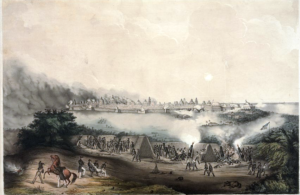
A national mystery
The Virginia Historical Society inherited a national mystery in 1981. That’s when it obtained the deButts-Ely family papers. The collection contains Robert E. Lee correspondence, and among it, a surprising letter from the Siege of Veracruz. In that letter, Robert E. Lee praised an unknown hero. But no one suspected that man was an assassin – the perpetrator in a record-breaking German cold case.
Lee at the Siege of Veracruz
General Winfield Scott masterminded the siege in March 1847 as the opening gambit to his campaign in the Mexican-American War. While General Zachary Taylor remained in northern Mexico, far from the capital, Scott planned an amphibious landing near Veracruz. He wanted to capture the Mexican port city and then march inland, following Cortez’s route from centuries before, to sack Mexico City.
The Siege of Veracruz was Robert E. Lee’s first battle. He directed the fire at an onshore naval battery. A German company from Pennsylvania’s first regiment was assigned to defending it. Eight Americans died at the battery before the U.S. won the siege, and one of those deaths made a profound impression on Lee. On April 11, he put his feelings on paper in a letter to his son Custis:
Robert E. Lee’s mystery letter
There was one poor fellow that behaved nobly. His thigh was broke by a cannon ball & he was laid in a trench at the rear of the battery for security, the balls & shells were flying so thick that he could not be borne away. A bush was stuck over him to keep the sun out of his eyes & all that we could give him was occasionally a cup of bad warm water. The men at the guns were hot & thirsty & drank up the water as fast as it could be brought. It was at some distance & the balls swept over the field & at such a furious rate that the officers would not let the men go for water except when they could not do without it. There the poor fellow lay till evening; when they got a litter & was bearing him off, when a shell fell & burst & a fragment killed him. He laid the whole day with the balls & bombs flying over him without uttering a complaint. His sufferings must have been very great, for the battery kept up a constant & brisk firing & the concussion from the 32 [pounders] & Paixhan guns shook the whole ground & must have pained him terribly. I doubt whether all Mexico is worth to us the life of that man.*
This unknown hero has been a discussion point in the literature. Why would Robert E. Lee balance American military objectives against the life of one man and find them lacking?
But no one, until now, has asked who that man was.

The unknown hero turns out to be a long-sought criminal
A careful comparison of the American casualty list against descriptions of the deaths at the naval battery in primary sources such as logbooks, letters, and a newspaper account from an embedded journalist all point to a German volunteer in the 1st Pennsylvania.
Robert E. Lee couldn’t have known the man’s background. It would have shocked him. The man was the assassin in a record-breaking German cold case – 19th-century Germany’s coldest case ever solved and its only murder ever solved in the USA.
For the first time, Death of an Assassin: The True Story of the German Murderer Who Died Defending Robert E. Lee (Kent State University Press, September 1, 2017) brings these two stories together. It offers American history packaged in international true crime wrapping. You can order the book here on Amazon.
Next week we’ll look at the German case and the letter from America that provided the crucial clue.
Literature on point:
*Robert E. Lee to George Washington Custis Lee, 11 Apr. 1847, deButts-Ely family papers, Virginia Historical Society.
Elizabeth Brown Pryor, Reading the Man: A Portrait of Robert E. Lee Through His Private Letters (New York: Penguin Books, 2009; discusses the letter on p. 173).
Bernice-Marie Yates, The Perfect Gentleman: The Life and Letters of George Washington Custis Lee, Vol. 1 (Xulon Press, 2003; discusses the letter on pp. 92-94).




sounds real interesting
Thanks, Rick! I think so too. You can imagine my surprise when, while researching a German murder, I discovered the Robert E. Lee connection.
I love all of your stories SO much!! I have always loved history and although it may not be politically correct at the moment, I have always loved Robert E Lee. I believe he was one of the very best generals and leaders ever. Not only that, but he was a man with so many admirable qualities. If he had fought for the Union, I believe the war would have been over in a year and many thousands of lives saved. But he had to follow what his conscience told him, and that was to fight with his state of Virginia and states rights. I have always loved history and the way you write about it makes it extremely exciting. I recently bought this book and am excited about reading all the details.
I agree Lee was a good general and that the war would have ended differently if he had fought for the Union. One of the most poignant episodes of American history was Lee’s agony over which side to choose. I think people from the North would understand the war better if they realized what the South saw in Lee and why it chose him as a leader. Thanks for commenting, Susan!